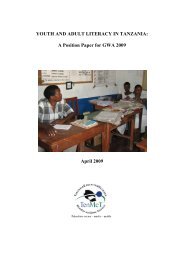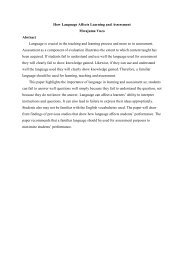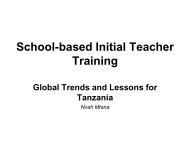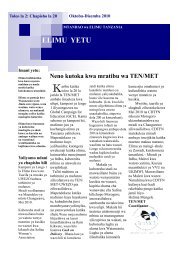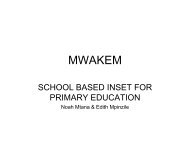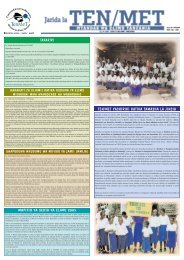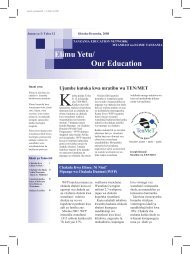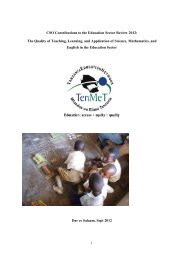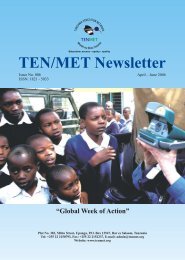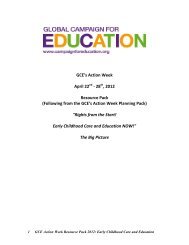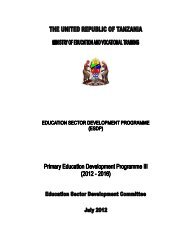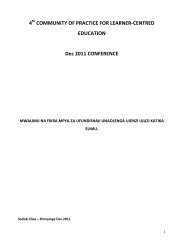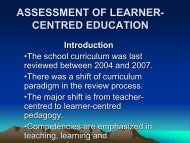Status of Children in Tanzania - 2012 - Tanzania Education Network ...
Status of Children in Tanzania - 2012 - Tanzania Education Network ...
Status of Children in Tanzania - 2012 - Tanzania Education Network ...
Create successful ePaper yourself
Turn your PDF publications into a flip-book with our unique Google optimized e-Paper software.
Call for Action<br />
It was noted that the right to education is one <strong>of</strong> the rights that has been violated. This is evidenced by high rate <strong>of</strong><br />
dropout at primary schools and secondary schools. Among the causes <strong>of</strong> dropout is teenage pregnancy, which denies<br />
teenagers from complet<strong>in</strong>g school. <strong>Tanzania</strong> is one among the countries with highest rate <strong>of</strong> teenage pregnancy<br />
annually stood at 8000 girls. Statistically between 2008 – 2010 16,650 girls dropped from school because <strong>of</strong> teenage<br />
pregnancy. Programme like the Complementary Basic <strong>Education</strong> Tra<strong>in</strong><strong>in</strong>g (COBET) has been <strong>in</strong>troduced to ensure<br />
that the right to education is not violated, among girls. However the success <strong>of</strong> this programme has not yet been<br />
evaluated to determ<strong>in</strong>e its impact.<br />
Disabled children right to education <strong>in</strong> <strong>Tanzania</strong> has not been adequately considered. Inclusive education has not<br />
properly been realised. For example, they are socially be<strong>in</strong>g excluded from public. There is no adequate <strong>in</strong>frastructure<br />
to support them atta<strong>in</strong> basic education. It was also established that <strong>Tanzania</strong>n children are deprived <strong>of</strong> their right to<br />
protection e.g. there is a high rate <strong>of</strong> child sexual, physical, emotional violence and deprivation <strong>of</strong> basic needs. This is<br />
very evident <strong>in</strong> Musoma, Zanzibar, Kagera and Ir<strong>in</strong>ga. Experience <strong>of</strong> <strong>Tanzania</strong> further demonstrates that the right to<br />
identity is someth<strong>in</strong>g that has not been denied as a right to children. The percentage <strong>of</strong> birth registration <strong>in</strong> <strong>Tanzania</strong> is<br />
lowest as compared to other countries <strong>of</strong> East Africa. Statistically it is only 16.3% <strong>of</strong> new birth, which are registered <strong>in</strong><br />
<strong>Tanzania</strong>. Majority <strong>of</strong> the people seems not to understand the importance <strong>of</strong> hav<strong>in</strong>g proper child registration. Despite<br />
the National effort to establish Registration Insolvency and Trusteeship Agency (RITA) as an agency to facilitate<br />
registration, yet National record show that <strong>Tanzania</strong> is the lowest among all East Africa countries. Such a service is<br />
still a dream to most <strong>of</strong> the <strong>Tanzania</strong>n <strong>in</strong> peripheral regions like Mtwara, L<strong>in</strong>di, Ruvuma, and Rukwa.<br />
<strong>Tanzania</strong> children are denied rights to participation, <strong>in</strong> different social sett<strong>in</strong>gs despite form<strong>in</strong>g children council to<br />
defend their rights. <strong>Tanzania</strong>n government however has strived to put a system that can promote children‟s<br />
participation rights. This <strong>in</strong>cludes the <strong>in</strong>troduction <strong>of</strong> children council at ward and district levels for the purpose <strong>of</strong><br />
identify<strong>in</strong>g rights <strong>of</strong> children which are be<strong>in</strong>g contravened. More than 80% <strong>of</strong> children <strong>in</strong>terviewed revealed that they do<br />
not have opportunity to participate <strong>in</strong> decision mak<strong>in</strong>g at home, this is much more serious <strong>in</strong> rural areas than urban<br />
areas.<br />
Similarly, access to justice and safety for children was not observed <strong>in</strong> prisons. For example, some are kept together<br />
with adults <strong>in</strong> the same cell (453 <strong>in</strong> prison) or retention (591), or police stations. Interviews with children at police<br />
station and detention revealed that children are abused, tortured, mistreated, delayed to be sent to trial, and denied<br />
legal representation or advice before be<strong>in</strong>g sent to court. All these are contrary to the conventions on children rights<br />
call<strong>in</strong>g for a major <strong>in</strong>tervention.<br />
The study further identified other critical issues that significantly underm<strong>in</strong>e children‟s rights. This has a direct l<strong>in</strong>kage<br />
to children right. The issues <strong>in</strong>clude access to water as rights to children. The study established that 38% <strong>of</strong> school do<br />
not have clean and safe water, 90% <strong>of</strong> <strong>Tanzania</strong>ns not have quality latr<strong>in</strong>es and 52% <strong>of</strong> latr<strong>in</strong>es used by girls <strong>in</strong><br />
schools do not have doors. This state <strong>of</strong> sanitation is a threat to children and some can contract illness.<br />
The f<strong>in</strong>d<strong>in</strong>gs also revealed that food <strong>in</strong>take to children was <strong>in</strong>adequate and 40% <strong>of</strong> children under-five years are<br />
stunted. Thus, a significant number <strong>of</strong> children stunted <strong>in</strong> their growth and others are underweight. All these violated<br />
basic rights <strong>of</strong> children <strong>in</strong> terms <strong>of</strong> surviv<strong>in</strong>g and development. The study noted <strong>in</strong> Iramba, Lushoto that children who<br />
were under this category were victims <strong>of</strong> suffer<strong>in</strong>g, exploitation, abuse and sometimes survived with only one meal.<br />
Thus could not enjoy life as other children. In Coast, Mtwara, S<strong>in</strong>gida, Lushoto, Dodoma the study also identified that<br />
<strong>in</strong>come poverty, child poverty, cultural factors and environmental factors were mak<strong>in</strong>g children more vulnerable and<br />
acted as a basis that triggered violation <strong>of</strong> children rights.<br />
Recommendations<br />
Bas<strong>in</strong>g on the f<strong>in</strong>d<strong>in</strong>gs, it is recommended that;<br />
Child social protection and uphold<strong>in</strong>g <strong>of</strong> children rights<br />
<br />
SOS <strong>Children</strong>‟s Villages can consider design<strong>in</strong>g a model <strong>of</strong> small family care options at Iramba and<br />
through that programme assist <strong>in</strong> promot<strong>in</strong>g access to education and protection <strong>of</strong> children as well as<br />
conduct<strong>in</strong>g FSP outreach program to empower vulnerable families.<br />
<br />
SOS can design programme on targeted districts like Iramba, Unguja, Mtwara and Mara to<br />
scale up efforts to elim<strong>in</strong>ate worst forms <strong>of</strong> child labour target<strong>in</strong>g households with abused or<br />
orphans children.<br />
Awareness Rais<strong>in</strong>g and Sensitisation <strong>in</strong> regards to children Rights<br />
<br />
SOS <strong>Children</strong>‟s Villages can consider establish<strong>in</strong>g a sensitization programme at Mtwara focus<strong>in</strong>g on<br />
enabl<strong>in</strong>g young mother who are victims <strong>of</strong> teenage pregnancy to rejo<strong>in</strong> school and complete their<br />
education cycle.<br />
<br />
<br />
SOS can work with other child development partners to conduct awareness rais<strong>in</strong>g education to<br />
different players responsible <strong>in</strong> promot<strong>in</strong>g children rights at families, communities and at school<br />
target<strong>in</strong>g Iramba, Mtwara and Dodoma.<br />
Large parts <strong>of</strong> population are not aware on child rights and their responsibilities to children.<br />
SOS should organize awareness sem<strong>in</strong>ars on child rights and elim<strong>in</strong>ation <strong>of</strong> child stigma at<br />
ward development committee, full councils and community members at village level.<br />
iv / 55<br />
<strong>Tanzania</strong>-CRSA-REPORT-<strong>2012</strong><br />
A lov<strong>in</strong>g home for every child




